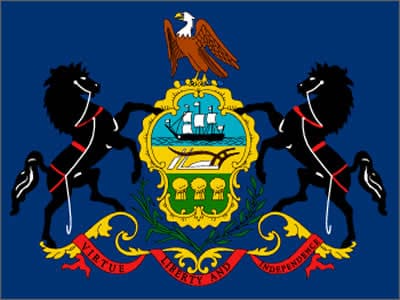Back in May we talked about how Pennsylvania was considering an online gambling bill. Recently, the Pennsylvania House of Representatives passed HB 2150 with a 114-85 vote. If it passes the Senate, the bill will allow the state to regulate all forms of online gambling, including online poker and Daily Fantasy Sports. It will also loosen the current regulations regarding slot machines.
Details of the Bill
In the bill’s current form, Pennsylvania will allow each of its twelve land-based casinos to pair up with a state-approved online gambling provider to host online various casino and poker games. To create this partnership, casinos will have to pay $8 million for a five-year license, and their partnered operators would have to pay an additional $2 million for the same licensing privileges. After the first five years, casinos would pay annual renewal fees of $250,000, while operators would pay $100,000.
Each licensed casino’s gross gaming revenues will be subject to a 16 percent tax. Two percent of this tax is slated for “economic development projects,” while the remaining 14 percent would be put towards lowering the state’s massive budget deficit.
Though it sounds promising, it’s important to note a gaping hole in this legislation. As the proposal stands right now, there is no provision for playing poker on a mobile device. This is the kind of thing that could cause casinos to take a huge hit in revenues because of how popular mobile gaming has become.
Interestingly enough, despite the lack of an online poker mobile provision, six of Pennsylvania’s airports will be allowed to offer mobile gambling. These special airport mobile gambling licenses will cost $1 million apiece, and revenues will be taxed at 54 percent. In addition, off-track betting parlors and Daily Fantasy Sports operators will also be allowed to do business in the state. OTB parlors will finally be able to set up slot machines for the first time, while DFS operators will be permitted to apply for special licenses. These licenses will cost only $50,000 and their revenues will only be taxed at 5 percent.
Next Steps For HB 2150
Though it passed easily through the House, the bill must now be introduced to the Senate. There is no timeline for this at the moment, but there will undoubtedly be heated debate over it. In the past, t Senate has expressed several major concerns over legalizing online gambling in Pennsylvania, including the issue of problem gambling and the potential cannibalization of the land-based casino industry.
In fact, it was just last year that the Community, Economic and Recreational Development Committee brought proposals to the floor that would seek to impose a 54 percent tax rate on any online gambling operators. While this is the same figure that brick-and-mortar casinos and airports are subject to, the percentage is far too high to make online gambling provisions feasible for the state. It is likely that these proposals were formulated specifically with the knowledge that such a high tax rate would render online gambling untenable.
HB 2150 will also be facing pretty significant pushback from several senators who are very vocally anti-gambling. Pennsylvania is desperate for additional revenue sources, however, so there is a possibility that these senators will allow the bill, in one form or another, to end up on the governor’s desk.
As recently as six months ago, the Senate refused to even consider online gambling regulations to facilitate deficit reduction. When asked why that is, Senate majority leader Jake Corman simply responded by saying, “We don’t have the votes for that. I mean, that’s just plain and simple that won’t happen.” Though the Senate seems to be rethinking its former stance on the issue, it’s still unclear whether Governor Wolf would sign the bill – in any form – into law.

